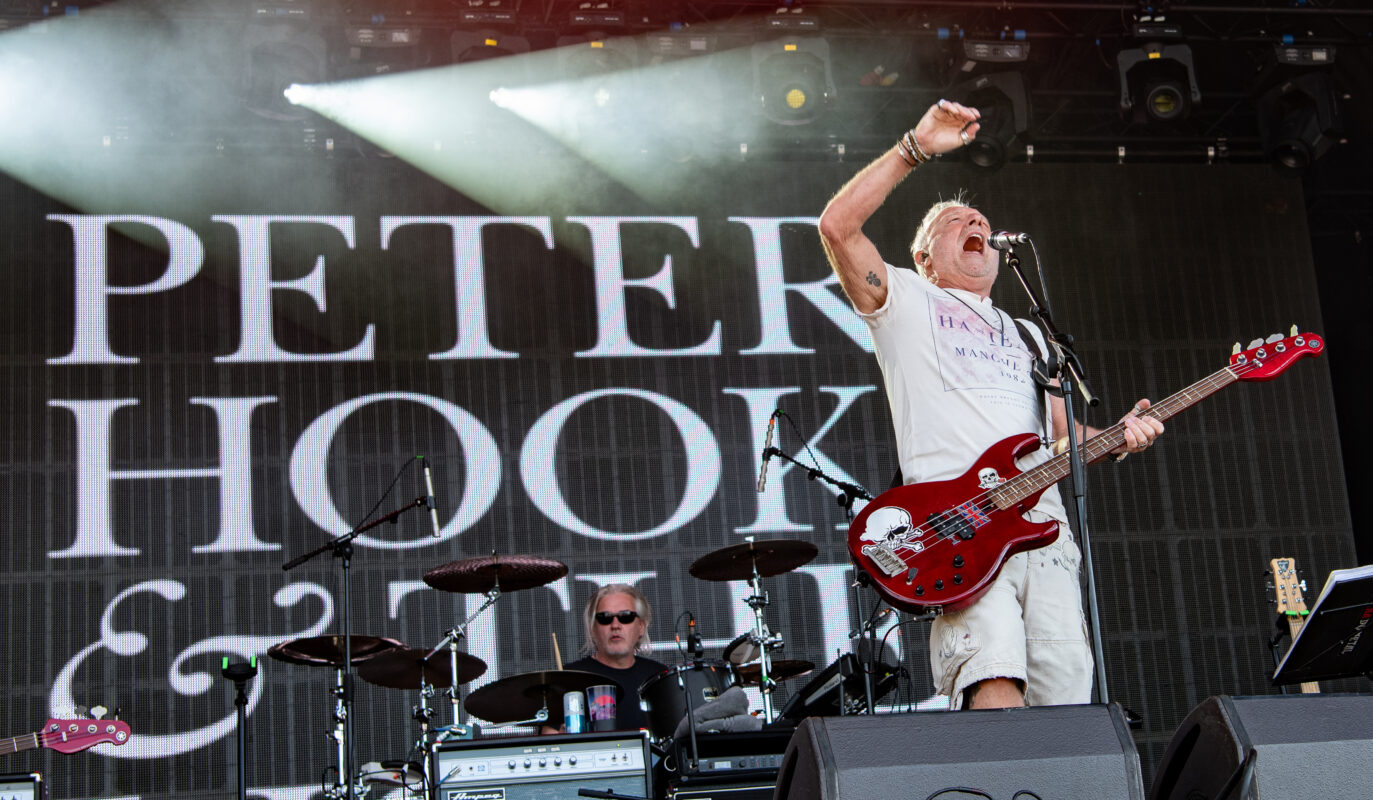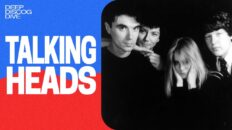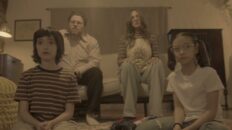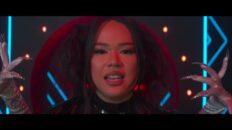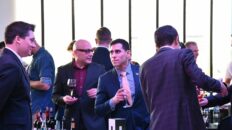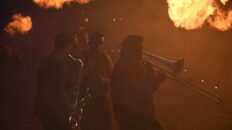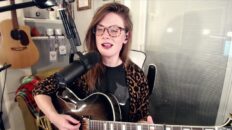Peter Hook is a legendary figure in music history, best known as the bassist and co-founder of Joy Division and New Order. His distinctive melodic basslines helped define the post-punk era and continue to inspire musicians around the world. Now touring with his band Peter Hook & The Light, he brings the legacy of both bands to life onstage—connecting deeply with old fans and new generations alike. Ahead of his appearance at the Punk Rock Bowling Festival in Las Vegas, Hooky shares insights into his career, tour life, his love for Mexico City, and his ventures into film.
CAREER & LEGACY
RUD: Looking back at your time with Joy Division and New Order, what moments stand out as the most defining in your musical journey?
PH: After almost 50 years it is hard to look back and pick out specific moments, but there are definitely a few things that jump out – for various different reasons. I suppose the first defining moment was seeing the Sex Pistols at the Lesser Free Trade Hall in Manchester in 1976, because that was the moment where Barney and I decided that we wanted to get instruments and form a band. The next defining moment would probably be the passing of Ian Curtis sadly, because that was such a life changing thing for all of us to go through and deal with, losing a close friend as well as a bandmate and at such a young age, it was just tragic – and nothing was ever the same again. Deciding to carry on as New Order would be the next one because that decision would set the stage for the next 27 years of my life until we split up in 2007, which in itself is another big moment because we have been fighting ever since! I started playing as Peter Hook & The Light back in 2010 and that was probably the last big moment to mention because that decision has allowed me to reconnect with my music, freed from what had become the shackles of touring with New Order, and it has really given me a very enjoyable 15 years to this point.
RUD: How did you develop your iconic bass-playing style, and did you ever imagine it would influence so many generations?
PH: Well it’s quite simple really – my gear at the time when we were starting out was so poor that I could literally only hear myself if I was playing high up the neck, so it was born out of necessity really. I would play high so I could hear myself over Barney’s loud guitar amp and basically because my equipment dictated that that was the only way I could be clearly audible. It was then Ian Curtis who used to say to me “Hooky, Hooky, play high! That sounds great! Do that again! Steve, put some of them jungle drums to Hooky’s bass! Barney, play that riff around the high bassline Hooky’s got!” and that was Joy Division. Of course I developed it a bit more with New Order as I became a better musician and certainly getting the six string bass opened more doors for me to when it came to playing in that style.
RUD: What has it been like revisiting classic material with The Light? Has your relationship to those songs changed over time?
PH: I must say it has been absolutely wonderful to be able to revisit my back catalogue with The Light over the last 15 years. My goal is to have played every single song I’ve ever written at least once, and we are well on the way to achieving that! The lads in the band are all great musicians who work really hard and are so enthusiastic about the material that sometimes I wish I had written it with them instead! My gimmick is mainly playing the albums in full and so that has presented a lot of unique moments where I have been forced to play some songs that maybe I don’t like as much or that are hard to play – we can’t skip them! So in that respect, yes, it has changed my relationship to some songs because I play them and then I’m like “Oh my God this is brilliant!”. A good example of that would be the Republic album from 1993. That certainly is not one of my favourite albums and was also not enjoyable to make, but playing it live with The Light really made me realise how great some of the songs are and how sad it was that we never played them that much as New Order.
PUNK ROCK BOWLING & VEGAS SHOW
RUD: You’re playing at the Punk Rock Bowling festival in Las Vegas—what does playing a punk-focused festival mean to you, given your roots in post-punk?
PH: It’s a funny one because with The Light we get offered punk festivals where they want us to play Joy Division, goth festivals where they want us to play early New Order, and also electronic festivals where they want us to play dance-y New Order. So it’s testament to the lads in the band really that they are able to rehearse so many different songs and tailor our setlists to suit the vibe of each show. The punk festivals are always particularly exciting for me because it just throws me right back to where I started, and the crowds are always brilliant. There’s a punk festival in England called Rebellion that we play a lot as well, quite similar to what I think Punk Rock Bowling will be like. So we are all really looking forward to it.
RUD: What can fans expect from your set at PRB? Are there any deep cuts or surprises planned?
PH: That’s strange actually because we literally just finalized the setlist for it the other day and rehearsed all of the songs for it. It’s quite difficult to be honest with you because we only have 60 minutes at the festival which makes it difficult to choose which songs to play, because at our own shows we will regularly play for almost 3 hours. The set is billed as the best of Joy Division and so that is exactly what we will be presenting at PRB – a retrospective of the various sides of the band going from the early, punky Warsaw material right through to some of the songs from our second album Closer that were veering to a more electronic kind of sound, plus everything in between! My son Jack who plays bass in The Light with me is in charge of making the set lists and he does a great job making sure we cover a bit of everything. I don’t want to just play the punkier material because I think it’s important to show that our songwriting was also developing over time.
RUD: Vegas has its own wild energy—do you approach performing there any differently?
PH: I love Las Vegas, I really do – there is certainly nowhere else like it! For whatever reason, we have actually only played Las Vegas one time as The Light, about ten years ago at Brooklyn Bowl. So it’s great to be coming back again finally and even better to be headlining at such a fun and cool looking festival. We have a couple of nights off around the show as well so I am sure that the lads will be out and about enjoying the sights and sounds of Vegas – I prefer to stay in the hotel watching zombie movies these days…
TOURING & MEXICO CITY
RUD: You’ve toured extensively around the world, but you’ve often mentioned how much you love Mexico City. What makes the city—and its fans—special to you?
PH: Mexico City is undoubtedly one of the best and most passionate audiences anywhere in the world. We sort of have a real love affair with Mexico City as The Light – we tend to play there a lot, and the people are always so warm and welcoming to us. It’s hilarious because every time we announce that we are going back there I always get some ‘haters’ shall we say, slagging me off for coming so much, saying I should be paying the local taxes as a resident. But no, the reason we come so much is simply because we love it and the people there seem to love us, which is wonderful. We are working our way through my back catalogue chronologically and I think Mexico City is one of the only places where we have played every single album. So I fully expect to be going back there again soon, and I am always happy to see it on the itinerary.
RUD: Do you have any memorable experiences from past shows in Mexico that still stick with you?
PH: The first time we played there as The Light in 2011 was pretty wild – we played at this really small place called Pasaguero and I remember thinking there were so many people crammed in that there is no way this would happen at home! They ended up having to open the main doors at the back of the gig to let the people crowded outside on the street listen. They were hanging off the streetlamps and everything trying to see in! So I will never forget that one. Another one would probably be in 2016 when we played the Joy Division and New Order Substance albums at the Pepsi Centre because that is one of the biggest headline shows we have ever done as The Light.
RUD: How has the global reception to your music evolved, especially in places like Latin America?
PH: One of the best things about touring around the world as I do is seeing the high amount of young people that are coming to these shows. When I started doing this as The Light in 2010, I honestly thought that the audience would just be full of old blokes like me! But no, the audiences actually seem to be getting younger and younger, particularly in Mexico and South America. I remember the most recent time we played in Mexico the entire front few rows in the standing area were just all young kids which is a really nice compliment because it shows that the music we made is still being discovered and enjoyed by new audiences even almost 50 years later.
FILM & MEDIA
RUD: How does it feel seeing your story and that of your bands told through film? Is there anything you’d like to set the record straight on?
PH: There are two main films really that tell the story – ‘24 Hour Party People’ and ‘Control’. Michael Winterbottom’s ’24 Hour Party People’ is more of a comedic take on the rise and fall of Factory Records, our old record label. Steve Coogan did a great job as Tony Wilson, and I really enjoyed the film but there are a few daft bits that maybe didn’t really happen or are embellished a little bit for comedic purposes. Anton Corbijn’s ‘Control,’ on the other hand, is a lot more serious and is a really in depth look at Joy Division and particularly Ian Curtis. I was shocked when I first saw it about how accurately Anton had captured us all, but it makes sense because he was there with us at the time and even took some of the most iconic photographs of the band, so of course he would know how to accurately portray us. I think they are both great films that sort of serve different purposes.
RUD: Are there more film or documentary projects you’d like to be involved in moving forward?
PH: I can’t think of anything specific at the moment but I’m always popping up as a talking head in various music documentaries which is always fun. Sometimes I’ll forget I’ve done one and then start watching it only to be surprised when I see myself on there!
BONUS / PERSONAL QUESTIONS
RUD: After all these years, what still excites you most about being on stage?
PH: Honestly, just the fact that I am still here doing it at the ripe old age of 69 and that there are still people all around the world who want to listen to our music – that’s enough to get me excited! It’s better than getting a real job I suppose! Haha!
RUD: What’s on your playlist these days—any new artists or bands you’re enjoying?
PH: I tend to listen to a lot of dance music these days so sometimes I will listen to something and love it without ever really knowing who the artist is. In terms of bands, I know they’re not new per se, but the material of The National is at least pretty new to me and they are a band that I really enjoy. I came across them thanks to them having a song called New Order T-Shirt which I really liked, so they are on my playlist a lot at the moment.
RUD: If you could go back in time and give young Peter Hook one piece of advice, what would it be?
PH: Without any hesitation I would just go back and save Ian Curtis, because that was such a tragic loss, not just to us as his friends and bandmates but to the world in general. I wish that he was coming to Las Vegas with me for Punk Rock Bowling.
RUD: Thank you so much for taking the time to answer our questions! See you in Las Vegas!
Photograph Credit: Rhona Murphy


